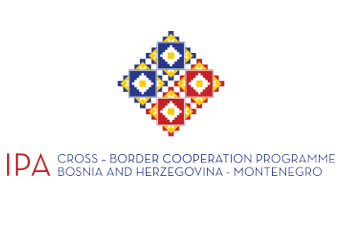Filter Search for grants
Program navigation
Program key data
IPA III Bosnia and Herzegovina-Montenegro

| Parent program | Instrument for Pre-accession Assistance |
| Link to the program | cbc.bih-mne.org |
Content of program
| short description | The Cross-Border Cooperation Program Bosnia and Herzegovina – Montenegro 2021-2027 will be implemented within the framework of IPA III. Its general goal is to contribute to the improvement of good neighbourly relations and the promotion of sustainable, dynamic, strong and connected communities. |
| program objectives | The programme will support projects aimed at environmental protection, promotion, adaptation and mitigation of climate change, risk management and prevention, but also at a better business environment and competitiveness through encouraging the development of tourism, protection of cultural and natural heritage. More sustainable and better cultural/natural tourism products, improving the capacity of competent and emergency services to manage risks from natural and man-made disasters, improving the capacity of local authorities, business entities and civil society organizations to solve the challenges of climate change are just some of the expected results of the Program cross-border cooperation Bosnia and Herzegovina – Montenegro 2021-2027 which will ultimately contribute to the improvement of living and working conditions in the border area. In this way, the series of successes achieved through projects within the framework of IPA I and IPA II will continue, during which tourist services were improved and significant progress was made with the aim of creating new opportunities for further development, work, employment and motivating people to create better conditions through their own efforts for themselves and the community. read more |
| Expected results | The programme includes the following thematic clusters and suggests the following (non exhaustive) types of measures. Thematic cluster 1: Improved employment opportunities and social rights
Thematic cluster 2: Greener and improved resource efficiency
Thematic cluster 3: Improved public infrastructure/connectivity (transport, digital, energy, waste and water)
Thematic cluster 4: Improved business environment and competitiveness
Thematic cluster 5: Improved capacity of local and regional authorities to tackle local challenges
read more |
Eligibility criteria
| Regions / countries for funding | Bosnia and Herzegovina (Bosna i Hercegovina / Босна и Херцеговина), Montenegro (Црна Гора) |
| eligible entities Partners |
Research Institution incl. University, Education and training institution, Non-Profit Organisation (NPO) / Non-Governmental Organisation (NGO), Public Body (national, regional and local; incl. EGTCs) |
| Mandatory partnership | Yes |
| Project Partnership | The applicant must act with at least one co-applicant as specified hereafter. If the applicant is established in Bosnia and Herzegovina, at least one co-applicant must be established in Montenegro, and vice versa. The maximum number of co-applicants that could be involved in the action is not set. However, CBC partners must carefully bear in mind the most appropriate conditions to ensure an intra-project efficient coordination when deciding on this. |
| other eligibility criteria | There are 70 cities and municipalities in the programme area, of which 56 in Bosnia and Herzegovina and 14 in Montenegro. Bosnia and Herzegovina: Federation of Bosnia and Herzegovina (FBiH, 35 cities and municipalities):
Republika Srpska (RS, 21 cities and municipalities):
Montenegro (14 cities and municipalities):
|
Additional information
| Topics | Administration & Governance, Institutional Capacity & Cooperation, Agriculture & Forestry, Fishery, Food, Soil quality, Air Quality, Biodiversity & Environment, Climate & Climate Change, Water quality & management, Arts & Culture, Cultural Heritage, Tourism, Circular Economy, Natural Resources, Competitiveness of Enterprises, Employment/Labour Market, SME & entrepreneurship, Digitalisation, Digital Society, ICT, Disaster Prevention, Resilience, Risk Management, Education & Training, Children & Youth, Media, Energy Efficiency, Renewable Energy , Mobility & Transport, Rural & Urban Development/Planning |
| Relevance for EU Macro-Region | EUSAIR - EU Strategy for the Adriatic and Ionian Region, EUSDR - EU Strategy for the Danube Region |
| UN Sustainable Development Goals (UN-SDGs) |
|
| Contact | IPA Bosnia and Herzegovina-Montenegro Joint Technical Secretariat +387 33 788 780 infoJTS@cbc.bih-mne.org Website |
Geschlossene Calls
03.10.2025 - 28.11.2025
First Call Cross-border Programme Bosnia and Herzegovina - Montenegro (Concept note)
05.06.2023 - 25.07.2023